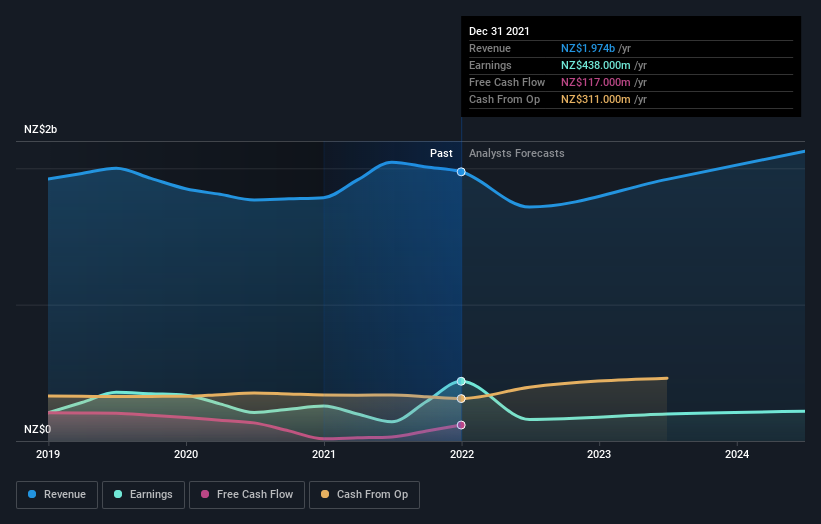- New Zealand
- /
- Electric Utilities
- /
- NZSE:MCY
The Consensus EPS Estimates For Mercury NZ Limited (NZSE:MCY) Just Fell Dramatically

One thing we could say about the analysts on Mercury NZ Limited (NZSE:MCY) - they aren't optimistic, having just made a major negative revision to their near-term (statutory) forecasts for the organization. Both revenue and earnings per share (EPS) estimates were cut sharply as the analysts factored in the latest outlook for the business, concluding that they were too optimistic previously.
Following the latest downgrade, the current consensus, from the four analysts covering Mercury NZ, is for revenues of NZ$1.7b in 2022, which would reflect an uneasy 13% reduction in Mercury NZ's sales over the past 12 months. Statutory earnings per share are supposed to plummet 70% to NZ$0.096 in the same period. Previously, the analysts had been modelling revenues of NZ$1.9b and earnings per share (EPS) of NZ$0.13 in 2022. Indeed, we can see that the analysts are a lot more bearish about Mercury NZ's prospects, administering a substantial drop in revenue estimates and slashing their EPS estimates to boot.
See our latest analysis for Mercury NZ

Analysts made no major changes to their price target of NZ$6.11, suggesting the downgrades are not expected to have a long-term impact on Mercury NZ's valuation. Fixating on a single price target can be unwise though, since the consensus target is effectively the average of analyst price targets. As a result, some investors like to look at the range of estimates to see if there are any diverging opinions on the company's valuation. The most optimistic Mercury NZ analyst has a price target of NZ$7.22 per share, while the most pessimistic values it at NZ$4.20. There are definitely some different views on the stock, but the range of estimates is not wide enough as to imply that the situation is unforecastable, in our view.
Taking a look at the bigger picture now, one of the ways we can understand these forecasts is to see how they compare to both past performance and industry growth estimates. We would highlight that sales are expected to reverse, with a forecast 24% annualised revenue decline to the end of 2022. That is a notable change from historical growth of 3.7% over the last five years. Yet aggregate analyst estimates for other companies in the industry suggest that industry revenues are forecast to decline 2.4% per year. So it's pretty clear that Mercury NZ's revenues are expected to shrink faster than the wider industry.
The Bottom Line
The biggest issue in the new estimates is that analysts have reduced their earnings per share estimates, suggesting business headwinds lay ahead for Mercury NZ. Unfortunately they also downgraded their revenue estimates, and our aggregation of analyst estimates suggests that Mercury NZ revenue is expected to perform worse than the wider market. The lack of change in the price target is puzzling in light of the downgrade but, with a serious decline expected this year, we wouldn't be surprised if investors were a bit wary of Mercury NZ.
With that said, the long-term trajectory of the company's earnings is a lot more important than next year. We have estimates - from multiple Mercury NZ analysts - going out to 2024, and you can see them free on our platform here.
Of course, seeing company management invest large sums of money in a stock can be just as useful as knowing whether analysts are downgrading their estimates. So you may also wish to search this free list of stocks that insiders are buying.
New: Manage All Your Stock Portfolios in One Place
We've created the ultimate portfolio companion for stock investors, and it's free.
• Connect an unlimited number of Portfolios and see your total in one currency
• Be alerted to new Warning Signs or Risks via email or mobile
• Track the Fair Value of your stocks
Have feedback on this article? Concerned about the content? Get in touch with us directly. Alternatively, email editorial-team (at) simplywallst.com.
This article by Simply Wall St is general in nature. We provide commentary based on historical data and analyst forecasts only using an unbiased methodology and our articles are not intended to be financial advice. It does not constitute a recommendation to buy or sell any stock, and does not take account of your objectives, or your financial situation. We aim to bring you long-term focused analysis driven by fundamental data. Note that our analysis may not factor in the latest price-sensitive company announcements or qualitative material. Simply Wall St has no position in any stocks mentioned.
About NZSE:MCY
Mercury NZ
Engages in the production, trading, and sale of electricity and related activities in New Zealand.
Acceptable track record and slightly overvalued.
Similar Companies
Market Insights
Community Narratives



